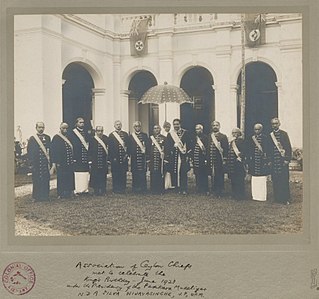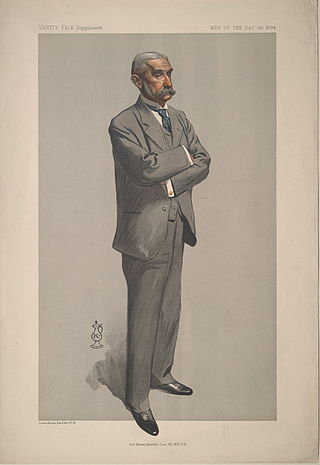Related Research Articles

St. John's College is a private school in Jaffna, Sri Lanka. Founded in 1823 by British Anglican missionaries, it is one of Sri Lanka's oldest schools.

Mudaliyar was a Ceylonese colonial title during Portuguese and British rule of the island. Stemming from the native headman system, the title was usually hereditary, made to wealthy influential families loyal to the British Crown.

The Roman Catholic Metropolitan Archdiocese of Colombo is a Latin Metropolitan Archdiocese of the Roman Catholic Church, whose ecclesiastical province covers all Sri Lanka plus the Maldives. It depends on the missionary Roman Congregation for the Evangelization of Peoples.
The 1962 Ceylonese coup d'état attempt was a failed military coup d'état planned in Ceylon. A group of Christian officers in the military and police planned to topple the government of Prime Minister Sirimavo Bandaranaike during the night of 27 January 1962. Organised by Colonel F. C. de Saram, Colonel Maurice De Mel,, Rear Admiral Royce de Mel, C.C. Dissanayake, Sydney de Zoysa and Douglas Liyanage, it was to take place in the night of 27 January 1962, but was called off as the government gained information in the afternoon and initiated arrests of the suspected coup leaders before the coup was carried out.

The Church of Ceylon is the Anglican Church in Sri Lanka. It is an extraprovincial jurisdiction of the Archbishop of Canterbury, who serves as its Metropolitan. It was established in 1845 with the appointment of the first Anglican Bishop of Colombo, James Chapman and until 1950 it consisted of a single diocese; in that year a second diocese was established at Kurunegala.
Evelyn Frederick Charles Ludowyk (1906–1985), was a Sri Lankan Burgher Shakespearean scholar, author, playwright and critic, and the first Professor of English of the University of Ceylon.

Sir Henry Austin Lee, was a British diplomat, governor and landowner. He was counselor of embassy, commercial attache for France, Belgium, and Switzerland. He was a tenant of the Channel Island of Jethou from 1890 until his death; he was succeeded as tenant of Jethou by Compton Mackenzie.
The Colombo Journal was a short-lived English-language bi-weekly newspaper in Ceylon. The newspaper started on 1 January 1832 with George Lee as editor. George Lee was the Superintendent of the Government Press and later Postmaster General. The newspaper had the support of the government and Governor Robert Wilmot-Horton. Apart from Horton and Lee other senior government officials who wrote for the newspaper included the governor's private secretary Henry Tufnell and George Turnour. Criticism of the British government led to the newspaper being closed by the Colonial Office on 31 December 1833.
The Ceylon Chronicle was a short-lived English-language newspaper in Ceylon. The newspaper started on 3 May 1837 with Rev. Samuel Owen Glenie as editor. Rev. Glenie was the Anglican Colonial Chaplain of St. Paul's Church and later Archdeacon of Colombo. Although owned privately by a group of civil servants, the newspaper took a pro-government stance and had the support of senior government officials. Governor Robert Wilmot-Horton, Treasurer Temple, Postmaster General George Lee, Acting Chief Justice Sergeant Rough, Auditor General Henry Marshall and Proctor Henry Staples all wrote for the newspaper. The Ceylon Chronicle was a counter-weight to The Observer and Commercial Advertiser which opposed the government.
The Ceylon Herald was an English-language newspaper in Ceylon. After The Ceylon Chronicle closed down on 3 September 1837 Mackenzie Ross bought the printing press and started The Ceylon Herald on 7 September 1838. The newspaper opposed the government bitterly. Governor Stewart-Mackenzie sued Mackenzie Ross for libel after The Ceylon Herald published an article alleging that the governor had gone to the Veddah country to purchase large amounts of land at nominal prices. Mackenzie Ross was acquitted after a trial before Chief Justice Anthony Oliphant.
The Methodist Church of Sri Lanka is a Protestant Christian denomination in Sri Lanka. Its headquarters is in Colombo and was established on 29 June 1814. It is a member of the World Council of Churches, the Christian Conference of Asia, the National Christian Council of Sri Lanka and the World Methodist Council.
Ceylonese recipients of British titles conferred on the advice of Her Majesty's Ceylon Ministers. This list includes all those who were born in, worked in or lived in Ceylon.
Sir John Charles Samuel Grenier was a Barrister and the 17th Attorney General of Ceylon. He was appointed on 30 September 1886, succeeding Francis Fleming, and held the office until his death in 1892. He was succeeded by Charles Layard.
Peter Daniel Anthonisz was a burgher doctor who was the first Ceylonese to obtain an M.R.C.P. and F.R.C.S. He was also the inaugural president of the Ceylon Branch of the British Medical Association and a member of the Legislative Council for nine years.
Frederick Charles Loos was a Ceylonese lawyer and politician.
John Gladstone Rajakulendran was a Ceylon Tamil politician and teacher.

Louis Sansoni served as the second Postmaster General of Ceylon, between 1816 and 1825.
George Lee was the first Superintendent of the Government Printing Office in Ceylon, between 1833 and 1835 and the Postmaster General of Ceylon between 1844 and 1859.
Dr William Gregory van Dort was a Ceylonese Burgher physician and politician.
References
- ↑ Senanayake, Manouri P Senanayake (2018). Odyssey of a Runaway Child: Galle to Australia's Goldfields and Beyond. Manouri P Senanayake. ISBN 9789555333672.
- ↑ "Journal of the Dutch Burgher Union of Ceylon". Ceylon's First Newspaper. Dutch Burgher Union of Ceylon. XXXVIIL: 80. July 1948.
- ↑ Denham, Edward Brandis (1912). Ceylon at the Census of 1911. H. C. Cottle - Government Printer. p. 12.
- ↑ Lewis, John Penry (1913). List of inscriptions on tombstones and monuments in Ceylon, of historical or local interest, with an obituary of persons uncommemorated. Dalcassian Publishing Company. p. 141.
- ↑ "The Kabistran Archives - Ireland - Ceylon - India". Holy Trinity Church, St Sebastian, Colombo (Ceylon) Sri Lanka Marriages from 1845. The Kabristan Archives. Retrieved 11 January 2021.
- ↑ "Allen's Indian Mail and Official Gazette". Births, Marriages and Deaths. XXVI: 976. 30 September 1868.
- ↑ Martyn, John H. (2003). Martyn's Notes on Jaffna: Chronological, Historical, Biographical. Asian Educational Services. p. 70. ISBN 9788120616707.
- ↑ "Ceylon Government Gazette No. 6577". Appointments &c., by the Governor: 112. 23 February 1900.